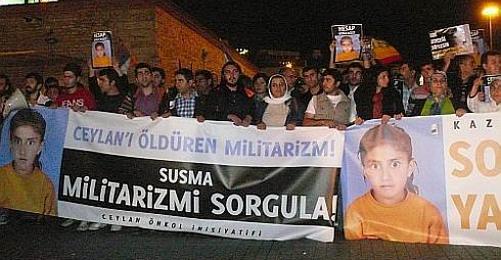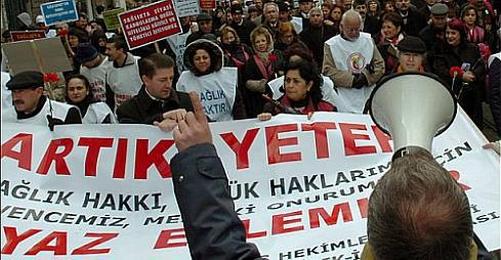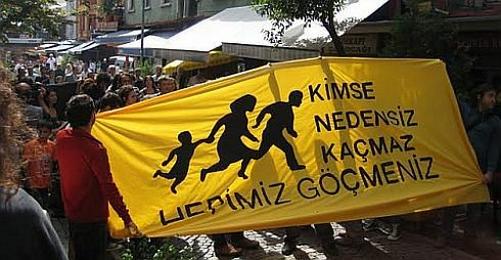Another Education for Another Communication
The second day of the forum hosted two panels one of which was "Education for Communication: Critical or Mainstream?" where Ferguson addressed participants.
Moderated by Bilgi University Communications Faculty Asst. Prof. Esra Arsan, the panel heard the views of Galatasaray Uniersity Communications Faculty Dean Prof. Dr. Ozden Cankaya, United Nations Children's Fund (UNICEF) Turkey program coordinator Lila Pieters and communication students Gokce Susam, Mutlucan Sahin, Selma Arslantas, Ayse Ozge Dogal and Elvin İnce.
Cankaya told the panel that the duty of communications faculties was not to train technicians for the sector, but individuals who could question the world, enlightening and cynical.
Pieters said the reason why the media continued to violate the rights of the child was the lack of education in this field during their academic training.
Students Susam and Sahin from the Galatasaray University Communications Faculty said another communication was possible only through raising questions for another education while students Arslantas, Dogal and İnce from the Ankara University Communications faculty screened a documentary on the dilemmas faced by students as result of the "unfortunate marriage of the media and academy".
Ferguson: Winning the freedom of expression is not enough
Involved in Media Studies and Media Education for more than 35 years and presently the Academic Coordinator for Erasmus Mundus students on Masters Course in Media and Communication at the Institute of Education of the University of London, Robert Ferguson addressed the panel with his speech titled "Different Models In Communication Education" where he gave advice that he referred to as the "5 P" to students, academics and journalists working in the media sector as media communicators.
Having lectured and published widely and particularly interested in representations of issues of 'race', identity and the media, Ferguson referred to the 5 Ps which were Power, Pleasure, Politics, Production and Pedagogy.
He said that ruling power was already existent in daily life stressing that what was important who used that power and who was monitoring it.
According to Ferguson, the power mechanism needs to be known well because whenever things needed to be said with regard to power, freedom of expression got involved.
But, said Ferguson, winning the freedom of expression is not sufficient enough. Having the freedom of expression does not mean what is being said is going to be listened to.
Ferguson believes that what is important is how radical messages will be given to the society while taking into account the messages without entertainment were not reaching people.
"What is important while writing a news report," he said, "is how you will properly relay your problem to the people who do not think the same way as you do". Ferguson stressed the importance of a language that would lead to debate among the readership and viewers.
As for the other P, standing for Pleasure, Ferguson showed the audience a miniature Chinese-made ornamental T-shirt which had the picture Che Guevera on it.
On Guevera's picture was written, "Click Here and see me naked", Ferguson noted that with the merchandise messages of sexual discrimination could be given.
"When talking of pleasure, we are not talking about being addicted to pleasure" he said. He added that what was needed was to be skeptical in education and to question almost everything.
Noting that the Politics he mentioned covered both individual politics and politics linked to international areas, Ferguson said there was the need to one by one look into what was instrumental to politics, whether these were soap operas or cartoons or other forms of broadcast. "It should be understood that each of these is part of the process" he said.
According to Ferguson, a communicator is also an educator.
"The issue is not being independent or in the opposition but to understand that world" he said. Noting that in the production phase it was necessary for production to be made with the understanding that everyone would use it, Fergusan said that despite this, it was not a necessity to reach large masses.
Ferguson, said the education period continued independently of the academy too and added, "people should start to think on their own. If you have the autonomy to criticize you can reinforce this with media communication. I take this a step forward and call it 'cynical solidarity'".
Communication Education in Turkey
Covering the history of communication education in Turkey, the distance between sectoral expectations and theoretical approaches as well as the quality of communication graduates, Prof. Dr. Cankaya noted that many things had changed in the country since newspaper founder Sedat Simavi had said "the only institute of a journalists is the newspaper itself".
Cankaya said criticism was being directed at them based on the theme 'you are training enemies of the media' because communication education failed to meet the demands of the sector but noted that communications faculties were not tasked only with giving information to find jobs.
"We have to educate students that will understand this world, question it and look at it critically" Cankaya said. "Whereas the issue of the argument is between education technicians or media producers that can debate and understand the problems in the society".
Cankaya noted that after their graduation students gave different responses to education because of the criticism they received in the sector and explained that a majority of students looked back after they started to work in belief that there should have been more practical education at school. Yet, he said, even the mainstream media expected communication faculties to produce ready-made personnel despite making no contributions to when they were doing their apprenticeship. "But," he added, "we are not training technicians".
Cankaya also criticized limitations on freedoms such as penal code article 301 and problems in union laws, saying that while fulfilling their jobs students did not have full independence due to these restrictions.
Another problem Cankaya attracted attention to was the increase in the number of students at faculties that was beyond the needs of the sector. The schools are crowded, he said, while the technical infrastructure is insufficient.
Pieters: Media violates children rights
In her speech on "Communication education: Introducing new elements / The rights perspective - Rights of child", UNICEF's Pieters evaluated news reporting with the focus of children.
Pieters said it was even more important for children rights education to be carrid out at academies, knowing that the future news reporters were being trained there.
"The child and media are a global problem today" she said. "The media has the power on this issue. But their rights are being violated every day."
Pieters noted that children had the right to express themselves whereas the views of children were hardly given place in the media. Also, she said, although there is the confidentiality of the child, if the media actually thought of this there would not be this much exhibition of children in newspapers.
Saying that all of these violations stemmed from the lack of proper education of media workers, Pieters gave examples backing her views where the photographs and open identities of victimized children were disclosed in the media.
Pieters agreed that a child involved in an offense or one that killed a teacher should be subject to news reports but said that the reasons that led to that offence must be covered in the same report. She said that the media needed to cooperate closely with academies on the issue and create solutions.
"Another communication, another education"
Galatasaray Univerity students Sahan ve Susam addressed the panel on the topic of "Re-thinking education not as a 'dicipline' but a process of liberation".
Susam started her speech by asking whet education meant in the process of gaining freedom and referred to theorists such as Foucault, Gramsci and Althusser referring to education as a control mechanism, an instrument of the ruling class or an instrument of the state's hegemony.
Susam said, however, that there have always been efforts to rid education of its negative character and gave in example Neil, Paulo and Illıch to this.
"In a society where militarist, male dominant, capitalist, nationalist expressions are prevalent, we are talking about women and men being able to take a critical distance to the roles expected of them such as upholding honor, motherhood, military service, good citizenship and being consumers" she explained.
"This distance itself is an important precondition to acquiring freedom and to transforming life".
Susam emphasized the important of debating the legitimacy of those ruling and pushing the limits of the administration, expressing belief in the need of a transformation that would encompass being able to debate andquestion what education in the process of freedom should be.
Sahan, on the other hand, referred to the importance of education from the tribal days till now with examples of bourgeois ideology, the French Revolution and the "Kemalist Revolution" in Turkey noting the transformations after such critical changes.
She said that in education rather than see people as equipment, they should be treated according to their personal capabilities with their hidden assets being identified. As nothing is set in concrete in communication yet, she said, this could be an important opportunity for struggle.
"Effectively communications is a very large area in developed capitalist countries and I believe it is the very essence of free struggle".
The presentation was followed by the screening of the documentary of "The children of an inauspicious marriage: Overcoming the dilemmas of communication education" by Ankara University Communications Faculty students Arslantas, Dogal and Ince. (EZO/II/YE)
Politician and NGOs Urge for Clarification of Önkol's Death

EU PROGRESS REPORT
Women's Rights Must be Implemented in Daily Life

Protests against Health Care Contribution Rate

Greens Launch Trial for Palovit Valley

"When Will Mohsen Abdolkhani and Hamid Karimnia Be Released?"





